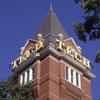news
Tech Offers Undergrads a Semester in Singapore
Primary tabs
The road to Singapore is about to get shorter. Beginning next fall, Georgia Tech undergraduates will be able to spend a semester abroad at one of two universities in Singapore, the National University of Singapore (NUS) and Nanyang Technological University (NTU) as part of a new bilateral student exchange program. Singapore Management University (SMU) will be added to the roster in spring 2006.
The Singapore exchange program is one of a series of steps Tech is taking to expand its international offerings to help students differentiate themselves from competition in the job market.
"We're trying to get students to have a more culturally rich experience overseas," explained Howard Rollins, director of the Office of International Education. "Rather than going for a few weeks, where they're seeing the country as a tourist, we want them to have the deeper experience that a semester abroad can offer."
In addition to Tech students going overseas, the program calls for students from the universities in Singapore to take classes at Tech each spring. Currently there are 27 students at Tech from NTU taking classes in a range of disciplines.
The new program will be available to students from all six of Tech's colleges and marks the first time undergraduates will be able to earn credits while spending a semester in Singapore. Tech's current presence in the country, The Logistics Institute - Asia Pacific at NUS, offers courses for graduate students only.
"Singapore is a terrific entry point into southeast Asia," said Merrick Furst, associate dean in the College of Computing. "There are a lot of natural interests that we have in common. Singapore is one of the world's largest shipping ports, and the problems they have with robotics are some of the things we're interested in working on from a technical point of view."
Furst recently returned from Singapore as part of a scouting trip that included faculty from each of Tech's colleges. Rollins and Associate Provost for Institutional Development Jack Lohmann accompanied the group.
"We were there to get a sense of the match between their curricula and what we do at Tech," said Charles Parsons, professor in the College of Management. "We wanted to see the types of electives they offered to broaden the cultural experience of our students and what it would be like for students to live there."
One aspect of Singapore that makes it particularly attractive for a semester abroad program is the fact that, as one of the country's official languages, English is spoken everywhere, including the classroom.
It's also a good place for students to make their introduction with Asia, said Doug Williams, associate chair in the School of Electrical and Computer Engineering. "They advertise themselves as 'Asia 101,' an easy transition for students who want to study abroad without the language barrier."
Given the cultural diversity of the country - its population is nearly 80 percent Chinese with a good mixture of Malays and Indians - Singapore is also a good place for students who want to dig deeper into some of the cultures of Asia.
"One thing that impressed me is that there are a lot of places very close to Singapore, like Sri Lanka and Indonesia that are easy to visit on a long weekend," said Williams.
These kinds of international partnerships are key to Tech's Quality Enhancement Plan, a requirement for institutional reaccreditation that outlines future academic programs and curriculum. Developing international competence through international coursework, second language proficiency and residential international experience is one of two focus areas. Currently 34 percent of undergraduates are involved in some form of international study, a figure that Tech hopes will rise to 50 percent over the next decade.
"We now have exchange agreements with about 40 countries," said Rollins. Earlier this year another faculty group visited India to investigate how Tech could establish a presence in that country. Tech is also exploring the possibility of having a program in China that could be very similar to the Singapore exchange, added Rollins.
Groups
Status
- Workflow Status:Published
- Created By:David Terraso
- Created:03/10/2005
- Modified By:Fletcher Moore
- Modified:10/07/2016
Categories
Keywords

